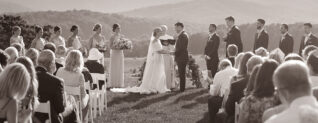Weddings in Virginia: Love and Legality
Researcher:
Dr Siobhan Magee
Virginia’s history is rooted in colonisation and the displacement of indigenous people. It fought for the Confederacy, against the abolition of slavery, during the American Civil War (1861-65). In the more recent past, the striking range of political opinion in Virginia has led to it being called a ‘swing’ state. Today it is held by the Democrats.
Weddings in Virginia reflect changing attitudes to marriage in the US, but they can also show changing ideas about what the US is. The 1967 Supreme Court case Loving v. Virginia, resulted in the ending of laws that prohibited people of different ‘races’ from marrying. Loving v. Virginia was cited in the 2015 Supreme Court case Obergefell v. Hodges, which legalised marriage between same-sex couples.
I carried out research in Charlottesville and Lynchburg. Charlottesville is the home of the University of Virginia and is often described as a ‘progressive bubble’. Lynchburg is the home of Liberty University, one of the world’s largest Christian universities. Liberty University was founded by pastor and televangelist Jerry Falwell (1933-2007), who was famous in the US for his ‘religious right’ activist group, the Moral Majority. Both cities are much more diverse than these reputations might suggest.
People in Lynchburg and Charlottesville say that weddings provide many local businesses’ ‘bread and butter’. Especially when presented together as a set, these objects demonstrate the sheer choice of wedding goods available in the US. They also show how people expect their weddings to say something about who they are as individuals.
I was struck by how, irrespective of political or religious beliefs, the couples I met were anxious about how to ensure a long and happy marriage. Many people said that ‘a wedding isn’t as important as a marriage’. But it was through weddings, and wedding objects, that people expressed their feelings about their faith, communities and love for their spouses.
This project has received funding from the European Research Council (ERC) under the European Union's Horizon 2020 research and innovation programme under grant agreement No 695285.






